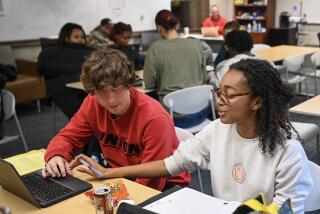CAMPUS CORRESPONDENCE : Why Most Students Cheat: It’s Not What You Think
- Share via
NEW BRUNSWICK, N.J. — Three-quarters of all college students have cheated at least once. And that may be a conservative estimate. A 1990 survey, conducted at the University of Miami, Ohio, found that nine of 10 students there cheated by methods ranging from copying a classmate’s answers during an exam to plagiarizing term papers.
Everyday, we hear and read that America is losing its competitive edge. One explanation is that American students are graduating without getting an education. Anyone who has spent some time in a college classroom can hardly disagree. But this is not entirely the fault of the undergraduate.
Many people find it hard to sympathize with students who cheat. If undergraduates, or their parents, are financing a college education, they have a responsibility to attend class, learn the subjects and complete assignments. But our institutions of higher learning also have a responsibility: to provide the kind of education that is not only interesting but stimulating. They have largely failed in this mission by choosing to become diploma mills.
The dynamics of the “system” are to blame. A majority of students don’t cheat because they are lazy, or hung over. They mostly cheat in classes they are forced to take. They mostly cheat in classes that are boring. Instead of using stimulating techniques to present their subjects, professors simply teach at students. An unmotivated professor sends a distressing signal to students--it’s easier for them to cheat, since they can blame their lack of intellectual interest on an uninspiring professor. Why should a student be any more interested in learning than a professor is in teaching?
Professors are the primary reason that cheating continues. If students are getting away with cheating, it’s usually the result of a lack of vigilance on the part of the professor. Ask any administrator. A lot of professors refuse to enforce academic integrity codes, thereby signaling students that they have little to lose by cheating. Indeed, if more professors looked forward to class day as much as they do to payday, the incidence of cheating would dramatically diminish. They should wake up.
Still, the American college professor must contend with administrators and college boards of trustees who have traditionally placed great pressure on them to produce research, attract federal, state and private grants, and get published. These pressures ultimately shortchange the student. The “publish-or-perish” mentality relegates educating to a secondary status. And these factors, combined with traditional professional laziness (read: tenure), have distorted priorities.
So where is the student in all of this? Students will continue to cheat until “the system” is reformed. One reason I wrote “Cheating 101” was to let outsiders in on college’s dirty little secret. Cheating in itself isn’t that bad, when compared with a system that tolerates--even encourages--cheating. Higher education clearly needs reforming.
One reform would be to promote greater interest in learning. Cheating is a paradox. Students cheat when they are not interested in a course or there is no mutual respect between student and professor.
Honor codes can discourage cheating. At the University of Virginia, which has the nation’s oldest code, student cheating is rare and does not go unpunished. The value of honor codes is that they encourage a student to be responsible. Statistics prove this approach works.
A related reform is to provide incentives for professors to be more vigilant in the classroom. Instead of simply acknowledging that cheating exists, they should push for honor codes where they don’t exist, and enforce them where they do. And administrators need to be prepared to back up their professors, rather than running scared from the mere threat of lawsuits. A Univeristy of Pittsburgh professor, for example, brought charges against a student after he found evidence that the student had copied exams, quizzes and lab reports. When the student’s father, a lawyer, threatened to sue, the case went nowhere.
No wonder cheating in college is hard to combat.
More to Read
Sign up for Essential California
The most important California stories and recommendations in your inbox every morning.
You may occasionally receive promotional content from the Los Angeles Times.










